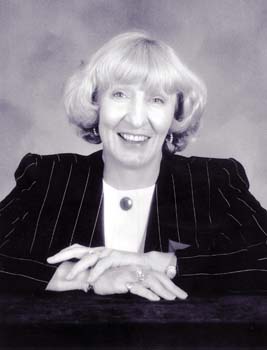 “People sometimes think that those who can’t do, teach,” says Jacquelyn Dillon ’58/63, “that you’re a teacher because you couldn’t make it as a performer. But with teaching, in some ways, you have to be better than the performers.”
“People sometimes think that those who can’t do, teach,” says Jacquelyn Dillon ’58/63, “that you’re a teacher because you couldn’t make it as a performer. But with teaching, in some ways, you have to be better than the performers.”
Dillon, director of string and orchestral studies and professor of music education and string pedagogy at Wichita State, has more than three decades of experience teaching.
As a pedagogue, she’s prepared students from preschool to graduate school for careers as performers, conductors and educators. An effective pedagogue, she says, must understand “the art from the most basic level to the performance level.”
Not an easy task, no matter the field. Yet Dillon is a proven master of her discipline, and her influence is far-reaching. Says Ingri Fowler ’80/94, an instrumental music educator at Wichita’s East High, “I can’t think of a time when, as an educator, I wasn’t reading something she’d written. She’s been instrumental to string programs.”
Dillon began her teaching career in the Derby, Kan., public school system, where she founded an orchestra program. A few years later, she repeated that success in Norman, Okla. Drawing on those experiences, she then co-authored How To Design and Teach a Successful String and Orchestra Program, which became a key textbook for music educators.
Dillon became a sought-after expert and began traveling to schools around the country. She says that although the travel could be taxing on one level, it gave her an advantage: “I could see the needs of programs better than someone who stayed in one place.” She adds, “I had a vision.”
Since those early days, Dillon has gone on to share her musical vision during nearly 3,000 professional appearances as a conductor, clinician and consultant in North America, Europe and Asia. She’s also held guest residencies at more than 50 universities.
“So many educators –– so many people — owe Jackie something,” Fowler points out, adding that Dillon’s effectiveness as an educator is built on her ability to connect with people: “She’s capable of making you feel that you’re important, that she’s genuinely interested in what you’re doing, what you’re saying.”
Dillon is fiercely dedicated to educating people about the benefits of school music programs. Music education of any kind, she argues, better prepares young people for the realities of adult life. “The discipline that young people learn in music is vital to their adult life,” she says. “They need that discipline. Ninety percent of the right notes in an orchestra or band performance is not acceptable.”
Her view on schools that offer band programs, but no string or orchestra opportunities, is that they can do better. A talented cellist, she points out that string and orchestra programs have the potential to reach students who might not find their voice with traditional band instruments. “A lot of kids are missed,” she says. “Some students might like the sound of stringed instruments, but of course they can’t play them in the band.”
Dillon reports that although school string programs have increased and people’s understanding of their importance has deepened, the number of musicians interested in teaching orchestral music has not grown at the same rate. To illustrate her point, she takes out a poster that reads “Wanted: 5,000 String Teachers,” designed soon after her tenure as president of the American String Teachers Association.
One reason for this shortage, she says, might be that there are still too few university programs that prepare future teachers to work with orchestras. “There are only about six U.S. universities that have really qualified teachers in this area,” she says. “School administrators who want fine programs know where those universities are.”
What began as a vision has evolved into a mission, one that Dillon sees as far from over. “I feel a responsibility to teach future teachers,” she reports. At a time in her career when many educators, even the most driven, would be thinking of retiring, Dillon isn’t: “I keep trying to hang it up and can’t.” Her reasons for continuing are pure and simple: she loves music, and she loves watching that love grow in others.
“It’s invigorating,” she says with a smile. “I get up on a Saturday morning to work with the youth orchestra and I feel tired, like I don’t want to do it. Then, 75 kids walk in with instruments, play music and my aches and pains go away. Maybe that’s the real beauty of music. It feeds the soul.”





